DSpace at VNU: Developing your own Franchise - A framework for Vietnamese Franchisors
Bạn đang xem bản rút gọn của tài liệu. Xem và tải ngay bản đầy đủ của tài liệu tại đây (229.86 KB, 5 trang )
Developing your own Franchise - A
framework for Vietnamese Franchisors
Nguyễn Quang Tiệp
Khoa Quản trị Kinh doanh
Luận văn Thạc sĩ ngành: Kinh doanh và quản lý; Mã số: 60 34 05
Người hướng dẫn: TS. Phạm Quý Long, ThS. Hà Nguyên
Năm bảo vệ: 2010
Keywords: Quản lý tiếp thị; Thương hiệu; Quản trị kinh doanh
Content
ACKNOWLEDGEMENT ..................................................................................................................i
ABSTRACT ..................................................................................................................................... ii
TOM TAT........................................................................................................................................ iv
TABLE OF CONTENTS ................................................................................................................ vii
LIST OF TABLES ............................................................................................................................ x
LIST OF FIGURES.......................................................................................................................... xi
LIST OF ABBREVIATIONS .......................................................................................................... xii
CHAPTER 1: FRANCHISING OVERVIEW ......................................................................... 4
Franchising definition ............................................................................................... 4
Types of Franchising ................................................................................................. 6
1.2.1
Traditional franchising ...................................................................................... 6
1.2.2
Business-format franchising .............................................................................. 8
1.2.3
The differences between traditional franchising & business-format franchising
9
1.3
Reasons for being a franchisor ................................................................................ 10
1.4
Industries suitable for franchising ............................................................................ 12
1.1
1.2
i
Common success factors for franchising ................................................................. 15
A successful prototype location (or chain of stores) ......................................... 15
A strong management team .............................................................................. 16
Sufficient capitalization .................................................................................... 17
A distinctive and protected trade identity .......................................................... 18
Proprietary and proven methods of operation and management ...................... 19
A demonstrated market demand for the product and services .......................... 20
Comprehensive training programs for franchisees .......................................... 21
A set of carefully developed uniform site selection criteria and architectural
standards 23
1.5.9.
A franchisee profile and screening system ....................................................... 24
1.5.10. An effective system of reporting and record keeping ........................................ 24
1.5.11. Field support staff ............................................................................................ 25
1.5.12. Research and development capabilities ............................................................ 25
1.5.13. National, regional, and local advertising, marketing, and public relations
programs 25
1.6
Success factors applied to Jollibee case ................................................................... 26
1.6.1
Corporate profile: ............................................................................................. 27
1.6.2
Analyze the success of JFC by key franchising success factors ....................... 27
1.6.2.1.
Successful prototype: Good ....................................................................... 27
1.6.2.2.
Management team: Excellent .................................................................... 28
1.6.2.3.
Capitalization: Good.................................................................................. 28
1.6.2.4.
Trade identity: Good.................................................................................. 28
1.6.2.5.
Methods of operation and management: Good ......................................... 29
1.6.2.6.
Market demand: Excellent ........................................................................ 30
1.6.2.7.
Training: Good.......................................................................................... 31
1.6.2.8.
Site selection criteria: Good....................................................................... 31
1.6.2.9.
Franchisee screening system: Good .......................................................... 31
1.6.2.10. Reporting and record keeping system ........................................................ 32
1.6.2.11. Field support staff: Good ........................................................................... 32
1.6.2.12. R&D: Good ............................................................................................... 33
1.6.2.13. Marketing & Advertising: Good................................................................. 34
CHAPTER 2: FRANCHISING IN VIETNAM ........................................................... 35
1.5
1.5.1.
1.5.2.
1.5.3.
1.5.4.
1.5.5.
1.5.6.
1.5.7.
1.5.8.
2.1.
An overview of Vietnam franchising market ........................................................... 35
2.2.
Franchising environment in Vietnam ....................................................................... 39
2.2.1.
Political environment ........................................................................................ 40
2.2.2.
Legal environment ............................................................................................ 42
2.2.3.
Economic environment ..................................................................................... 45
2.2.4.
Financial environment ....................................................................................... 46
2.2.5.
Social environment ........................................................................................... 48
2.3.
Challenges to opening a new franchise system in Vietnam .................................. 49
2.3.1.
Lack of experience ............................................................................................ 53
ii
Insufficient franchising consultancy .................................................................. 54
CHAPTER 3: FRAMEWORK FOR BUILDING A FRANCHISE .................. SYSTEM 56
2.3.2.
3.1.
Framework introduction .......................................................................................... 56
3.2.
Concept stage .......................................................................................................... 57
3.2.1.
Industry assessment .......................................................................................... 57
3.2.1.1.
Production and distribution occur in limited geographic markets ................ 57
3.2.1.2.
Physical locations are helpful to serving customers .................................... 59
3.2.1.3.
Local market knowledge is important to performance ................................ 59
3.2.1.4.
Brand name reputation is a valuable competitive ............................ advantage
3.2.1.5.
The level of standardization and codification of the process of creating and
delivering the product or service is high ...................................................................... 60
3.2.1.6.
The operation is labor intensive.................................................................. 61
3.2.1.7.
Outlets are not terribly costly to establish ................................................... 62
3.2.2.
Concept assessment .......................................................................................... 62
3.2.2.1.
Valuable system to sell .............................................................................. 63
3.2.2.2.
Transferable concept .................................................................................. 63
3.2.2.3.
Large pool ofpotential franchisees .............................................................. 65
3.3.
Pilot stage................................................................................................................ 67
3.3.1.
Site selection ..................................................................................................... 67
3.3.1.1.
Density of the primary target audience ....................................................... 68
3.3.1.2.
Traffic volume ........................................................................................... 68
3.3.1.3.
Traffic patterns .......................................................................................... 68
3.3.1.4.
Site visibility.............................................................................................. 69
3.3.1.5.
Traffic flow to the site................................................................................ 69
3.3.1.6.
Complementary versus contracdictory neighbors ....................................... 69
3.3.2.
Trade identity development & protection .......................................................... 72
3.3.3.
Operations manual ............................................................................................ 72
3.3.3.1.
Guidelines for preparation of the manual.................................................... 72
3.3.3.2.
Suggested outline for the operations manual of a franchisor ....................... 74
3.4. Expansion stage....................................................................................................... 77
3.4.1.
Pricing franchise ............................................................................................... 77
3.4.1.1.
Franchise fee .............................................................................................. 77
References
3
60
1. Andrew J. Sherman, “Franchising & Licensing - Two powerful ways to grow your
business in any economy”, American Management Association (AMACOM), 2004
2. Adapted from data contained in R. Bond, “Bond’s Franchise Guide”, 15th Annual
Edition, CA: Sourcebook Publications, Oakland 2004
3. Jane R. Plitt, “Martha Mathilda Harper and the American dream”, Syracuse Scott A.
Shane, “From Ice cream to the Internet - Using franchising to drive the growth and
profits of your business”, Pearson Education, Inc 2005
4. D. Williams, “Why Do Entrepreneurs Become Franchisees? An Empirical Analysis of
Organizational Choice”, Journal of Business Venturing, 1998
5. Khanna, Tarun, and Krishna G. Palepu, “Emerging Giants: Building World- Class
Companies in Developing Countries”, Harvard Business Review, 2006
6. Kleinfelder Philipp, “American Influence on Filipino Food Culture - A Case Study”,
2004
7. Philip M. Parker, “2003-2008 World outlook for franchising”, copyright ICON group
Ltd., 2003
8. Stephen Spinelli, Jr., Robert M. Rosenberg, Sue Birley, “Franchising - pathway to
wealth creation”, Prentice Hall, 2004
9. Thomas S. Dicke, “Franchising in the America: The development of a business
method, 1840 - 1980”, Chapel Hill, NC: University of North Carolina Press, 1992
10. An introduction to Franchising, IFA Educational Foundation 2001
11. American Heritage Dictionary of the English Language, Fourth Edition, Houghton
Mifflin Company, Boston 2000
12. Franchising in the Economy, United States Department of Commerce (USDOC), 1988
4
13. “Opportunities for Malaysian franchises in Vietnam” seminar, Malaysian Franchising
Association, Kuala Lumpur, 7 Oct 2010
14. The Profile of Franchising, International Franchise Association 3/2007
15. Vietnam Civil law, clause 755, 2005
16. Vietnam Commercial law 2005
17. Circular 1254/BKHCN/1998 guiding for Decree 45/CP/1998 on technology transferring,
was franchising mentioned in session 4.1.1
18. Decree 11/2005/NB-CP on transferring of technology
19. Decree 35/2006/NB-CP giving detail explanations for Commercial Law regarding
franchising
20. Circular 09/2006/TT-BTM (dated 25/5/2006)
21. University Press, New York
22. Economic development magazine, issue 219, January 2009
23. General Statistics Office
24. Saigon Economic Times Magazine
25. The CIA World Fact Book 2010
26. Centre for Corporate information, Ministry for Planning and Investment
27. FIA - MPI Vietnam:
28. Federal Trade Commission:
29. JFC official website: www.jollibee.com.ph
30. Nguoi dai bieu nhan dan newspaper:
31. Tuoi Tre newspaper:
32. VOV news:
33.
5

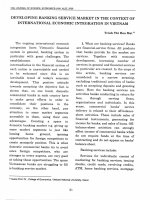
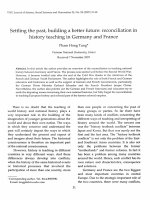
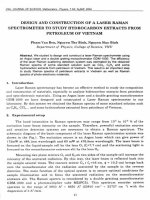
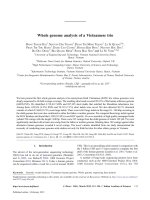
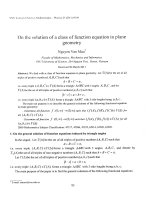
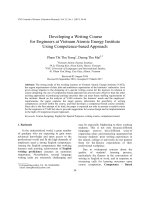

![DSpace at VNU: Bakhtine démasqué [Bakhtin unmasked]: A Reply to Critics](https://media.store123doc.com/images/document/2017_12/16/medium_yue1513244062.jpg)
